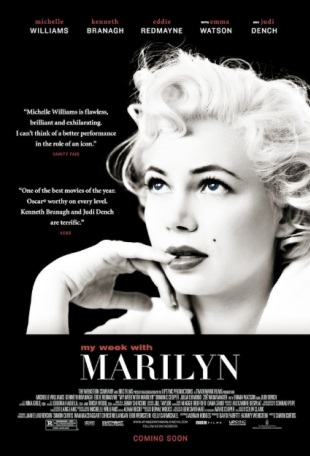Print Edition: December 7, 2011
 The first words that come to mind when thinking of Marilyn Monroe are usually “glamorous,” “talented,” “beautiful” and “awestruck.” What people rarely think about is a certain aspect of human life that we all take for granted – the value of true identity. That is what My Week with Marilyn reveals. It tells the story of how the public perceived the great Marilyn Monroe and how she wanted the world to really see her.
The first words that come to mind when thinking of Marilyn Monroe are usually “glamorous,” “talented,” “beautiful” and “awestruck.” What people rarely think about is a certain aspect of human life that we all take for granted – the value of true identity. That is what My Week with Marilyn reveals. It tells the story of how the public perceived the great Marilyn Monroe and how she wanted the world to really see her.
Based off of his memories, the film centers around Colin Clarke (Eddie Redmayne), a young man who dreams of making it big in the film business. He acquires a production position on Sir Laurence Olivier’s (Kenneth Branagh) directorial debut, The Prince and the Show Girl. When Marilyn Monroe (Michelle Williams) arrives in England to play the lead actress in the film, he becomes all the more excited.
With biographical films being all the buzz in Hollywood, one would wonder what My Week With Marilyn brings to the table. All in all, it does not bring anything that people have not seen before and it does not show a different perspective of Monroe that any other film has not already shown. What it does bring is an enhanced perspective of those previous views. With Michelle Williams’ terrific performance, we are given a bold and yet demoralizing impression of Marilyn Monroe. We see Monroe at her weakest times and how she goes through the motions of life. We see how the world objectified her rather than loved her as a person. More mysteries about the starlet are revealed in Clarke’s interactions with her, including a lost childhood and an aspiration for motherhood. Clarke shows us what he saw behind the face everyone knew and all that she hid from the world. While Sir Laurence Oliver (Kenneth Branagh) and Arthur Miller (Dougray Scott), Monroe’s husband at the time, view her acts to be desperate cries for attention, Clarke discovers that she is only asking to be loved and to feel like a human being. However, upon being thrust into a position of such popularity, she forsakes herself for the public and her fans despite the repercussions she suffers as a result.
The other characters of the film are a toss-up. Kenneth Branagh is splendid by presenting Sir Laurence Oliver as a sympathetic man; a rather interesting portrayal. Eddie Redmayne gives a surprising performance as Colin Clarke – while being the underdog of the lot, he does not let the power of his fellow actors devour him. His chemistry with fellow actress, Michelle Williams, is probably the best part of the film and their interactions are realistic and compelling, especially as they build an unorthodox relationship that is entertaining to watch unfold.
The other members of the film are enjoyable but their incomplete presentations assume that the audience already possesses knowledge of the story and characters. Judi Dench is more the cheery grandmother type than an important symbol as Sybil Thorndike. Dominic Cooper is only given one face as Marilyn’s single-minded production assistant. And Emma Watson is more of an obstruction than a real character; she is introduced randomly during the story and does not develop as a character when, in reality, she is someone quite important to Clarke. The real shame of the movie, though, is Zoë Wanamaker and her portrayal of Marilyn’s acting coach, Paula Strasberg.
These assumptions of prior knowledge create complications with the film as obstacles seem to manifest out of thin air, rather than being constructed in a fluid manner. The film focuses so much on the main characters that the rest of the plot is sometimes abandoned and plot holes begin to appear in the story. Due to this, it is difficult for the audience to stay focused.
While the narrative is certainly weak at times, it does not take away the performances given by the film’s main leads. Michelle Williams has come a long way from Dawson’s Creek and she continues to astound us with a believable and surreal performance. She is able to show the true side of the icon who many thought was on top of the world. She reveals a secretly troubled and broken woman who persevered against her slow demise in an attempt to win the public’s affection.


